-
Comparisons
-
Hardware Features
-
Systems
-
Software
-
Company
Knowledge-Base
- Hardware Features
- Clock
Sampling Speed Details
The sampling rate defines the speed with which the ADC (or DAC) is sampled. The sampling rate is given in Samples per second to distinguish from the signal frequency or bandwidth which is given in Hz or kHz or MHz. On all Spectrum products the sampling rate can be programmed by software to adjust the amount of data that is acquired (replayed) per second. By setting the sampling rate the time between two samples is defined and can be calculated by [sample interval] = 1 / [sampling rate]. Examples:
- Sampling rate 100 kS/s (kilo Samples per second); sample interval between two samples = 10 us (micro seconds)
- Sampling rate 50 MS/s (Mega Samples per second); sample interval between two samples = 20 ns (nano seconds)
- Sampling rate 400 MS/s; sample interval between two samples = 2.5 ns or 2500 ps (pico seconds)
Selecting a matching sampling rate
The sampling theorem states that to avoid aliasing, the sample rate of a digitizer needs to be at least twice the highest frequency component in the signal being acquired. Sampling at just twice the highest frequency component is not enough to accurately reproduce fast edges in time-domain signals. Accurate digitizing of a signal requires the digitizer's sample rate should be at least five to ten times the required bandwidth. The below screenshots show the same sine signal being sampled with different sampling rates both in time domain and frequency domain:
| 9 MHz signal 20 MS/s sampling rate 2 times oversampling |
9 MHz signal 50 MS/s sampling rate 5 times oversampling |
9 MHz signal 500 MS/s sampling rate 50 times oversampling |
|---|---|---|
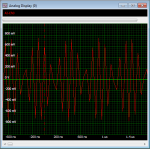 |
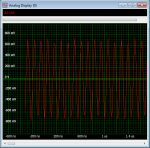 |
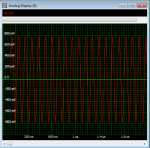 |
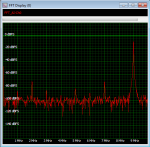 |
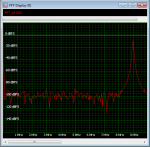 |
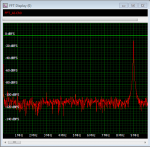 |
Acquisition (Replay) Memory Length
All digitizers and arbitrary waveform generators with kS/s or MS/s sampling rate utilize an on-board memory for data storage. This on-board memory limits the acquisition/replay length depending on the selected channels and the programmed sampling rate. There are various ways to extend the memory by using segmented acquisition (Multiple Recording, Gated Sampling, ABA Mode) or streaming data continuously (FIFO Mode) or by using programmable replay sequences (Sequence Mode for AWGs and Digital Output Cards).
Simultaneous sampling and Multiplexed sampling
The sampling rate in the data sheet is often stated as a maximum sampling rate that is only valid for one channel data acquisition. Depending on the structure of the card there may be limits (like maximum memory interface transfer speed or special interleaving ADCs) that prevent the product from sampling all samples with full speed. Nevertheless all Spectrum products utilize fully synchronous design with a separate ADC (DAC) and amplifier for all channels.
When comparing products of different suppliers you may run into so called multiplexing ADC cards. Inhere only a limited number of ADCs (in most times one ADC) and amplifiers is shared between multiple input channels. You may imagine that this design is very cost effective but has a lot of disadvantages especially for fast digitizer products. Read more on simultaneous sampling and multiplexed sampling